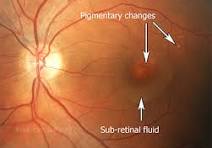INTRODUCTION
Health is wealth—a simple yet profound truth. One sickness can drain a
lifetime of savings, leaving individuals and families in distress. While modern
medicine has made remarkable strides in diagnosing and treating diseases, many
health conditions continue to defy medical solutions, pushing us to explore
alternative approaches.
Natural remedies have been a cornerstone of healing for centuries, long before
the advent of modern pharmaceuticals. Across cultures and civilizations, people
have relied on nature’s gifts—herbs, roots, fruits, and holistic practices—to
restore health and vitality. While this encyclopedia does not seek to undermine
the importance of medical science, it aims to complement it by shedding light
on time-tested natural solutions. It encourages further research into the power of
nature in healing, offering insights into remedies that have provided relief to
countless individuals.
Natural Remedies For Central Serous Retinopathy(CSR)
Central Serous Retinopathy (CSR) is a retinal disorder characterized by
the buildup of fluid under the retina, which can lead to blurred or
distorted vision. Its exact cause remains uncertain, but stress and
corticosteroid use are commonly associated with its onset. Although
there is no definitive natural cure for CSR, some complementary
lifestyle practices may support eye health and recovery. These natural
approaches are not substitutes for medical care but may enhance overall
well-being. Always consult a healthcare provider for an accurate
diagnosis and treatment plan. Here are supportive practices that may
assist in managing CSR:
1. Stress Reduction Techniques
How it works: Chronic stress can worsen CSR by increasing cortisol
levels, which may contribute to retinal fluid leakage. Managing stress
is crucial in preventing recurrences.
Preparation and usage:
Practice deep breathing—inhale through the nose for 4 seconds, hold
for 4 seconds, exhale for 4 seconds. Repeat several times.
Engage in mindfulness meditation or gentle yoga.
Use local resources such as community wellness centers or meditation
guides available at local markets near you.
2. Dietary Changes
How it works: A diet rich in vitamins and antioxidants can support
retinal health and reduce inflammation.
Preparation and usage:
Eat leafy greens (spinach, kale), carrots, berries, oranges, almonds,
and omega-3-rich fish like salmon.
Avoid excessive processed foods and added sugars.
Stay hydrated by drinking enough water daily.
3. Lutein and Zeaxanthin Supplements
How it works: These carotenoids concentrate in the retina and filter
harmful blue light, potentially reducing oxidative damage.
Preparation and usage:
Take supplements only after consulting your healthcare provider.
Look for products that also include zinc and vitamin C for added eye
support.
Follow the dosage recommended by your doctor or ophthalmologist.
4. Bilberry Extract
How it works: Bilberry is rich in anthocyanins, which may support
capillary health and reduce eye strain through antioxidant activity.
Preparation and usage:
Available in capsule or liquid extract form.
Take only under medical supervision to avoid potential interactions
or improper dosing.
5. Eye Hygiene
How it works: Good hygiene can prevent complications like
infections and reduce eye fatigue, which is beneficial during recovery.
Preparation and usage:
Clean eyelids with a soft cloth soaked in warm saline solution.
Avoid rubbing your eyes.
Follow any specialized routines recommended by an eye specialist.
6. Adequate Sleep
How it works: Proper rest allows the body to regulate hormones and
repair tissue, including ocular tissue.
Preparation and usage:
Aim for 7–9 hours of uninterrupted sleep per night.
Keep a consistent bedtime routine and avoid screen exposure before
sleep.
7. Reduce Caffeine and Alcohol
How it works: Excessive caffeine and alcohol intake may elevate
cortisol levels or worsen dehydration, potentially aggravating CSR.
Preparation and usage:
Limit coffee and energy drinks to one serving daily, or avoid them
altogether.
Reduce or eliminate alcohol consumption during recovery.
8. Blue Light Protection
How it works: Prolonged screen exposure can strain the eyes and
may worsen visual disturbances. Blue light protection helps reduce this
strain.
Preparation and usage:
Use blue light filtering glasses or apply blue light filters on digital
screens.
Follow the 20-20-20 rule: every 20 minutes, look at something 20 feet
away for 20 seconds.
Keep screens at least an arm’s length from your eyes.
Key Consideration
These natural practices are supportive and not curative. CSR can
resolve on its own in some cases, but persistent or recurrent symptoms
require professional intervention, including imaging (like OCT) and
possible treatments such as photodynamic therapy or anti-VEGF
injections. It is crucial to avoid self-diagnosis or delaying medical
attention. Always consult your eye doctor before introducing new
supplements or routines, especially if you’re already undergoing
treatment for CSR.




Thanks for your article. One other thing is the fact individual states have their very own laws which affect householders, which makes it quite difficult for the Congress to come up with a fresh set of recommendations concerning foreclosed on homeowners. The problem is that each state provides own regulations which may interact in an unwanted manner in relation to foreclosure guidelines.